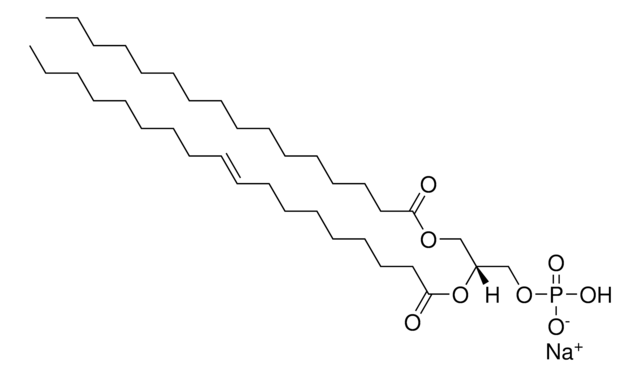857370P
Avanti
VU0155056
Avanti Research™ - A Croda Brand 857370P, powder
Synonym(s):
N-(2-{4-[2-oxo-2,3-dihydro-1H-benzo(d)imidazol-1-yl]piperidin-1-yl}ethyl)-2-naphthamide
Sign Into View Organizational & Contract Pricing
All Photos(3)
About This Item
Empirical Formula (Hill Notation):
C25H26N4O2
CAS Number:
Molecular Weight:
414.50
UNSPSC Code:
12352211
NACRES:
NA.25
Recommended Products
Assay
>99% (TLC)
form
powder
packaging
pkg of 1 × 1 mg (857370P-1mg)
manufacturer/tradename
Avanti Research™ - A Croda Brand 857370P
lipid type
bioactive lipids
shipped in
dry ice
storage temp.
−20°C
Application
VU0155056 has been used as a phospholipase D-1 (PLD1) inhibitor:
- to study its role in regulated exocytosis
- to test bacterial and human PLD enzymes for specificity of inhibition
- in neuro-2a (N2a) cell culture and survival assay
Biochem/physiol Actions
VU0155056 or N-(2-{4-[2-oxo-2,3-dihydro-1H-benzo(d)imidazol-1-yl]piperidin-1-yl ethyl)-2-naphthamide is a cell permeable phospholipase D (PLD) inhibitor. It inhibits both PLD1 and PLD2.
Packaging
5 mL Amber Glass Screw Cap Vial (857370P-1mg)
Legal Information
Avanti Research is a trademark of Avanti Polar Lipids, LLC
Storage Class Code
11 - Combustible Solids
WGK
WGK 3
Choose from one of the most recent versions:
Certificates of Analysis (COA)
Lot/Batch Number
Sorry, we don't have COAs for this product available online at this time.
If you need assistance, please contact Customer Support.
Already Own This Product?
Find documentation for the products that you have recently purchased in the Document Library.
Michael A Kennedy et al.
PLoS genetics, 7(2), e1001299-e1001299 (2011-02-25)
During Alzheimer's Disease, sustained exposure to amyloid-β₄₂ oligomers perturbs metabolism of ether-linked glycerophospholipids defined by a saturated 16 carbon chain at the sn-1 position. The intraneuronal accumulation of 1-O-hexadecyl-2-acetyl-sn-glycerophosphocholine (C16:0 PAF), but not its immediate precursor 1-O-hexadecyl-sn-glycerophosphocholine (C16:0 lyso-PAF), participates
Aditya Kulkarni et al.
Chemical biology & drug design, 84(3), 270-281 (2014-03-20)
Phospholipase D enzymes cleave lipid substrates to produce phosphatidic acid, an important precursor for many essential cellular molecules. Phospholipase D is a target to modulate cancer-cell invasiveness. This study reports synthesis of a new class of phospholipase D inhibitors based
Sarah McDavid et al.
PloS one, 9(10), e109203-e109203 (2014-10-03)
Butanol (C4H10OH) has been used both to dissect the molecular targets of alcohols/general anesthetics and to implicate phospholipase D (PLD) signaling in a variety of cellular functions including neurotransmitter and hormone exocytosis. Like other primary alcohols, 1-butanol is a substrate
Sarah A Scott et al.
Nature chemical biology, 5(2), 108-117 (2009-01-13)
Phospholipase D (PLD) is an essential enzyme responsible for the production of the lipid second messenger phosphatidic acid. Phosphatidic acid participates in both G protein-coupled receptor and receptor tyrosine kinase signal transduction networks. The lack of potent and isoform-selective inhibitors
Tatiana P Rogasevskaia et al.
The Journal of biological chemistry, 290(48), 28683-28696 (2015-10-04)
There are a diversity of interpretations concerning the possible roles of phospholipase D and its biologically active product phosphatidic acid in the late, Ca(2+)-triggered steps of regulated exocytosis. To quantitatively address functional and molecular aspects of the involvement of phospholipase
Our team of scientists has experience in all areas of research including Life Science, Material Science, Chemical Synthesis, Chromatography, Analytical and many others.
Contact Technical Service

![VU0359595 (1R,2R)-N-([S]-1-{4-[5-bromo-2-oxo-2,3-dihydro-1H-benzo(d)imidazol-1-yl]piperidin-1-yl}propan-2-yl)-2-phenylcyclopropanecarboxamide, powder](/deepweb/assets/sigmaaldrich/product/structures/317/424/cb93743d-b88f-4f55-8826-293f2730f20f/640/cb93743d-b88f-4f55-8826-293f2730f20f.png)






